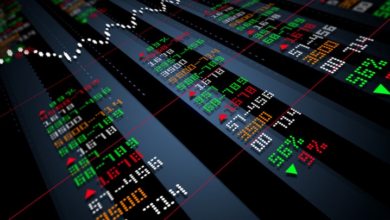Last month, Mahmoud Abbas, a member of the Salafi-led Nour Party, addressed newly elected members of Egypt's lower house of parliament and journalists in a conference at the Egyptian stock exchange, in an effort to reassure investors that markets will be safe under an Islamist-dominated parliament.
“I am an investor in the Egyptian exchange since 1996,” said Abbas, whose party has garnered about a quarter of the seats in the People's Assembly.
But as he spoke, it also became clear that the stock market might be seeing some changes in Egypt’s more Islamic-oriented political environment, such as an Islamic index on the country’s stock exchange.
It remains unclear what exactly an Islamist-controlled government could mean for the Egyptian economy, which is heavily dependent on tourism. In recent months, talk from Islamist politicians about limiting alcohol sales and dictating conservative beach attire have spurred fears that an Islamic government may toe a conservative line and crack down on industries they consider in contravention of Islamic Sharia law.
Representatives from the Muslim Brotherhood’s Freedom and Justice Party, which will control about 40 percent of the incoming parliament, and the Nour Party have both expressed a desire for a list of stocks for Sharia-compliant companies on the Egyptian market and the introduction of policies that would eventually foster a stock market that would be entirely religiously acceptable.
In Islam, interest is forbidden, as are other banking practices that are deemed usury or as taking advantage of a person’s financial need. Though interpretations of what is acceptable Islamic banking vary, with many transactions resembling widely accepted practices, profits in alcohol, pork and entertainment that features scantily clad women are unanimously considered prohibited.
Experts and party representatives have said that in the near future, the stock market might include both the market’s regular index of companies and a parallel index for companies with Islamic-certified practices in permitted industries.
Difficult implementation
For a company to make it onto the Islamic index, it must have adopted Islamic financial operations. Experts say that means very little of their investments can be locked up in interest-bearing activities or in industries not allowed in Islam.
Thus, an Islamic stock index must be in part predicated on the existence of a strong Islamic banking system in the country.
Egypt is lagging behind the United Arab Emirates, Saudi Arabia, Malaysia and much of the rest of the Arab world when it comes to Islamic banking. According to a 2009 report by the McKinsey consulting firm, Islamic banking only accounts for 3 to 4 percent of the US$193 billion banking industry in Egypt.
But that doesn’t seem to be due to a lack of demand on the part of Egyptians.
In the past, Islamic banking practices were discouraged by the Mubarak government, said Walid Hegazy, managing partner at the Hegazy Associates law firm and vice president of the newly founded Egyptian Society for Islamic Finance. Hegazy hopes his group will gather experts in the field and help connect them to Egyptian banks looking to cater to the Islamic-banking market.
Under Mubarak, he said, the political climate was so anti-Muslim Brotherhood that many feared that endorsing Islamic banking would boost the opposition group’s funding.
“We would hear rumors before the revolution, but deep inside we knew that the Central Bank and senior officials were not very sympathetic,” he said.
Now, Hegazy said, Egyptian companies are finally free to choose the kind of banking systems they prefer, and bankers see the market as full of customers who had previously refrained from using banks for religious reasons. FJP and Nour representatives said they saw this as a way to engage potential investors excluded by the corrupt economic policies of Mubarak and his cronies.
Even before Mubarak stepped down, many banks in Egypt were already looking to tap into the Islamic financial services market. Faisal Islamic Bank of Egypt, Bahrain’s Al-Baraka Bank and HSBC’s Amana bank have extensive operations growing here.
Hegazy said his group has been approached by representatives from Egypt’s biggest banks, many of whom are looking to expand into Islamic financial services.
“I think we have a chance, I’m very optimistic,” he said.
Who will be the authority?
In December, Adel Hamid, an FJP representative, said that Al-Azhar might emerge as an economic authority through which companies are Sharia-sanctioned.
The formation of such a board would give the religious institution great economic power. Hussein Hassan, a consultant on Islamic banking who has worked in the past with numerous Gulf financial institutions, said that he’s not sure the scholars are well-enough educated on how the modern international economy functions.
“There are some scholars so conservative they don't understand the nature of the economy,” he said.
As for the process of certifying companies, Hegazy is also not sure if Al-Azhar would be the best authority, though he thinks an Egyptian body should rule on Egyptian companies.
“Although I’m concerned the process of companies converting will be long process,” he warned.
Getting too caught up on labeling companies and banks is not important to the development of a more Islamic economy, according to Hassan. He said it is the Muslim investor’s responsibility, if he wants to invest in Islamic stocks, to examine a company’s balance sheet to see where its money is coming from and where it goes.
“We don't have to have the label of Islamic,” he said.
Many large companies that are not overtly religious conduct their business according to similar precepts found in Islam, he said. Shifting to an Islamic-certified designation would be relatively simple for them.
The important point, Hegazy said, is that Egypt's international standards do not lag under the development of its own authority, or else the stock exchange could lose further ground.
"The regulation cannot fall behind,” he said. “That would be disastrous."
He also warned against any authorities forbidding entire industries in the country for purely Islamic reasons. He says he hopes Egypt’s economy will remain free and Egyptians will still have the right to make their own consumption decisions.
"We’ll still have tobacco and alcohol companies in Egypt, hopefully."
An unclear timeline
Whatever happens, experts agree that the changes won't be quick.
“I see the first four years as showing why this system is better,” said Hegazy, who has also served as an advisor to the Brotherhood’s economic committee on Islamic banking.
“What I think will happen is we’re going to keep the stock exchange as it is, little by little developing Sharia-compliant investments.”
But some say politicians’ hopes of a completely Sharia-compliant stock exchange are unrealistic.
Even countries such as UAE and Malaysia that have Islamic-compliant components of their stock market have parallel indices of conventional, non-Islamic companies. In these economies, even Islamic-certified companies are still allowed to have a small amount of their holdings tied up in interest-earning debt.
They also use very liberal interpretations of Islamic financial law, according to Hegazy, especially Malaysia.
Given the interwoven nature of modern international finance, the goal of an Islamic stock market is not a political or economic reality for Egypt, or any country for that matter, according to Hassan.
“I don't think there will be any changes to make the Egyptian stock market an Islamic stock market,” said Hassan. “After all, it’s related to stock markets all over the world.”
“Until we have an Islamic central bank, then we cannot have 100 percent Islamic financial laws.”




